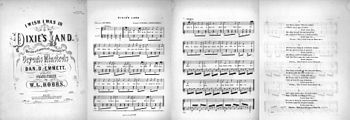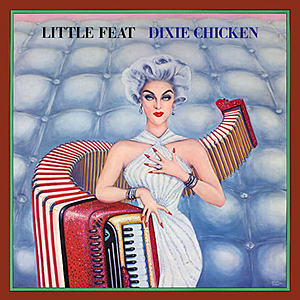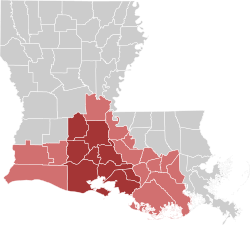My Uncle Mike is one of the funniest people I know. He's not funny in that he's cracking jokes every second--he's more like... just a comical person... a highly amusing person to be around. I love Uncle Mike.
Tonight he said, "Do you know where they got 'Dixieland' from?" I never know if he's really serious in what he's about to tell me. "The word, 'Dixieland,' do you know where it came from?" Two things happened. A. I was surprised because I'm pretty sure Uncle Mike is clueless about my interest in linguistic trivia, and B. I stopped to think about it, and realized I had never thought about it before. Where does the word "Dixie" come from?
He said something along the lines of: You know, the French used to own this area, the South, and you know what their word for "ten" is? That's right. Dix. --and they had paper money with 10 on it, and we became Dixieland.

The ten dollar notes were issued by private banks in Louisiana, and colloquially referred to as "dixies" by English-speaking Southerners, and the area around New Orleans and the Cajun-speaking parts of Louisiana became known as "Dixieland."
I had no idea! But it makes sense. I came home to research it. Turns out, that is only one of three etymological explanations. The actual origin of the term is not necessarily known.
A lot of transcriptions say "Dixie's Land" instead of "Dixieland."
There is a story about a slave owner whose name was Dixy, and he was very "kind" to his slaves, and when he died, his slaves mourned his death intensely. Thus Dixie's Land became a synonym for "paradise" and during the Civil War, the minstrel song "Dixie's Land," written by Daniel D. Emmett became popular among the slaves.

The dictionary says the word origin comes from the Mason-Dixon line, which for the most part, separated free and slave states.
I guess that could be it, too.

I'm honestly most inclined to believe the first explanation, strictly due to geographical references. The money explanation has New Orleans/French Louisiana as it's center. The "kind" Dixy in the second story was actually a slave-owner in Manhattan, NY--even though the song became popular in the South during the Civil War. And the Mason-Dixon line, well, yes it separated the North from the South but... isn't New Orleans the heart of Dixie?
We have Dixie beer brewed here, and Winn-Dixie supermarkets. Ok, ok. Dixie Beer is actually currently brewed in Heuber Brewery in Wisconsin (but only since Katrina flooded the brewery here), and Winn-Dixie supermarkets are based out of Jacksonville, FL and have stores in Florida, Alabama, Louisiana, Georgia, and Mississippi.
Why do I think that New Orleans is the heart of Dixie, then?
The Dixie Chicks are from Dallas, TX--and they got their name from a Little Feat album, Dixie Chickens. Which brings me to the music! Dixieland Jazz aka New Orleans Jazz is the earliest style of recorded jazz ever. It's all about the music! The term Dixieland became widely used after the advent of the first million-selling hit records of the Original Dixieland Jazz Band in 1917.
Louis Armstrong's trumpet is often thought of as the definitive sound of Dixieland. There are now several "styles" of Dixieland Jazz, including Chicago-style, and West-Coast revival. There are even international dixieland jazz music festivals, like the one in Dresden, Germany and the one in Catalonia, Spain.
How fun would it be to go to one of those? and say, "I live in the heart of Dixie."


